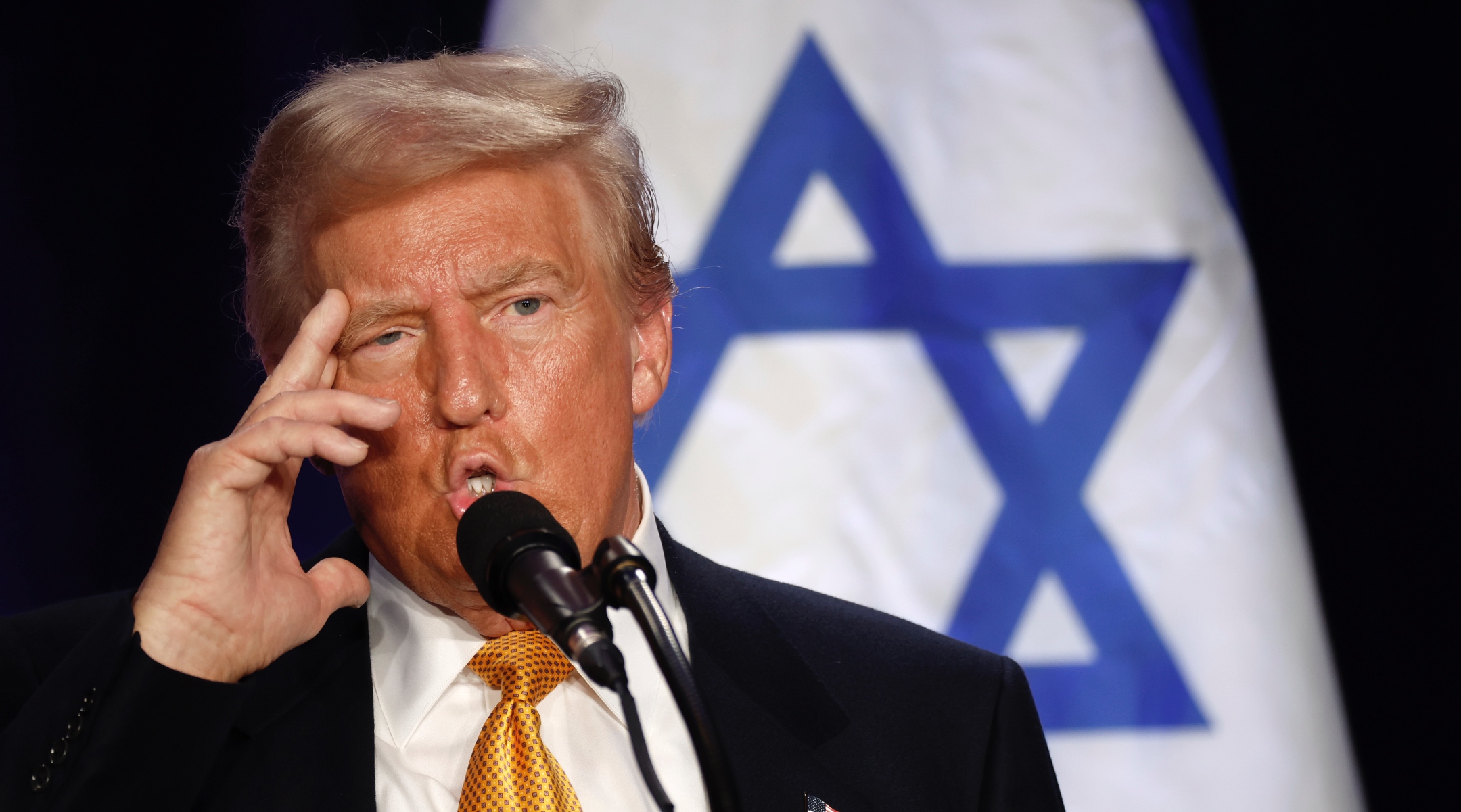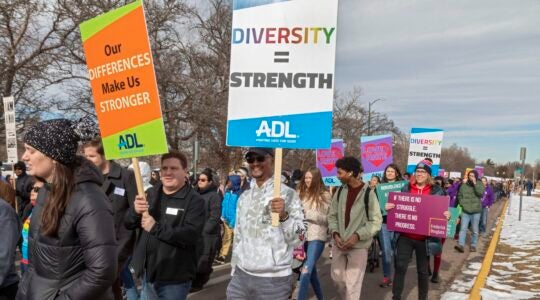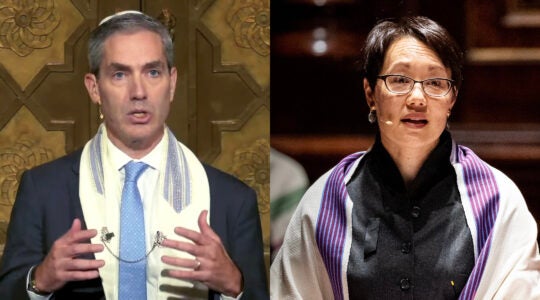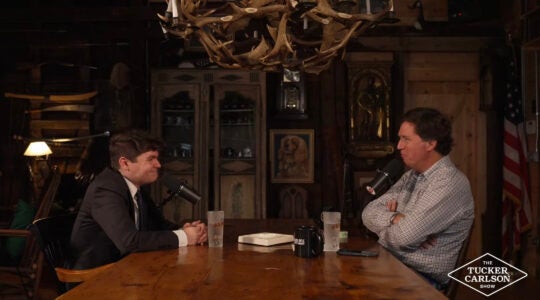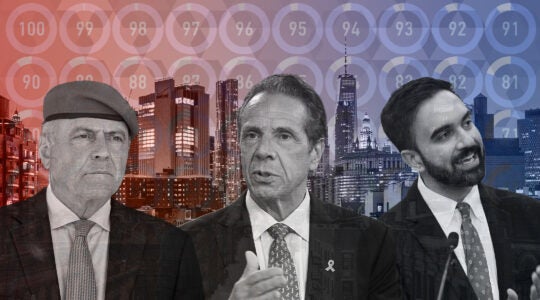WASHINGTON — Donald Trump has promised to protect the Jews. But now, some Jews are wondering whether they need protection from him.
In speeches Thursday night — the first to a small crowd of donors and backers billed as a “Fighting Antisemitism” event, the second to a packed ballroom at the Israeli American Council conference — Trump pledged he would be the “defender” of American Jews and of Israel.
“You have a big protector in me,” he told the Israeli Americans. He told his backers, “I will be your defender, your protector, and I will be the best friend Jewish Americans I’ve ever had in the White House.”
Both lines got him big applause. But it was another line that precipitated a flood of outrage and concern from Jewish groups and watchdogs that track extremist violence.
“I will put it to you very simply and gently. I really haven’t been treated right, but you haven’t been treated right, because you’re putting yourself in great danger, and the United States hasn’t been treated right,” he said.
Then, citing a high estimate of the proportion of Jews who may vote for him, he said, “The Jewish people would have a lot to do with the loss if I’m at 40%. Think of it, that means 60% are voting for Kamala.”
Trump blaming Jews for his potential defeat, which he has said would lead to ruination in America and Israel, sent shudders through liberal and centrist groups in a Jewish community already rattled by a year of rising antisemitism spurred by the Israel-Hamas war. It also alarmed watchdogs who have seen extremists inspired by Trump’s rhetoric engage in dangerous conduct.
And it cast a renewed spotlight on accusations that Trump is antisemitic at the very moment when he is seeking to position himself as a fighter for Israel and against antisemitism. The Jewish Democratic Council of America has already repeatedly branded him as an antisemite.
“President Trump, your words preemptively blaming Jews for your potential election loss is of a piece with millennia of antisemitic lies about Jewish power,” Rabbi Rick Jacobs, the president of the Union for Reform Judaism, said Friday on X. “It puts a target on American Jews. And it makes you an ally not to our vulnerable community but to those who wish us harm.”
The Jewish Council for Public Affairs, a national public policy group, was out with a statement within minutes, saying Trump was engaging in “dangerous dual loyalty tropes.”
The American Jewish Committee said Trump was endangering the Jewish community.
“Setting up anyone to say ‘we lost because of the Jews’ is outrageous and dangerous,” it said in a statement. “Thousands of years of history have shown that scapegoating Jews can lead to antisemitic hate and violence.”
Sharon Nazarian, a board member of the Anti-Defamation League, said the spike in antisemitism in recent years meant that Jewish communities should be especially on alert for Trump’s amplification of antisemitic tropes.
“Look, we can only look back and connect the dots,” she said. She then listed a number of antisemitic events and attacks that took place when Trump was in the White House, including the deadly neo-Nazi march in Charlottesville, Virginia, in 2017 and deadly far-right synagogue shootings in Pittsburgh in 2018 and in Poway, California, in 2019.
She also referenced the Jan. 6, 2021, riot at the U.S. Capitol spurred by Trump’s false claims that he had won the election, as well as the false rumors Trump has recently spread about Haitian migrants in Ohio eating pets. She worries that the Jewish community may find itself in a similar situation.
“Look at what happens when one community is singled out and targeted by candidate Trump, dehumanized and vilified,” she said regarding the Haitian migrants. “That community right now is in despair, living in fear for their lives. I think the Jewish community has to be prepared, given what he said last night.”
Trump has made efforts to depict himself as the candidate who will strengthen relations with Israel and defend Jews at home from hatred on the progressive left. He frequently cites his record on Israel during his term in office — including moving the U.S. embassy to Jerusalem and brokering normalization deals between Israel and neighboring countries. And he has charged that his opponent, Kamala Harris, and her party are sympathetic to anti-Israel forces, including on college campuses. He has claimed that her election would lead to Israel’s demise.
Jonathan Greenblatt, the ADL CEO, pointed out in a statement that blaming Jews for an election loss undermined his pledge.
“I appreciate that former President Trump called out antisemitism and recognized its historic surge,” he said. “But the effect is undermined by then employing numerous antisemitic tropes and anti-Jewish stereotypes — including rampant accusations of dual loyalty.”
He continued, “Preemptively blaming American Jews for your potential election loss does zero to help American Jews. It increases their sense of alienation in a moment of vulnerability when right-wing extremists and left-wing anti-Zionists continually demonize and slander Jews.”
Abraham Foxman, Greenblatt’s predecessor, said in an interview that he was already anticipating violence spurred by Trump, given the events of Jan. 6, 2021 — but that he was now worried that the threat was specifically elevated for Jews.
“I worry about violence in the streets, but I think that’s beyond us ‘unsupportive’ Jews,” said Foxman, who in 2020 campaigned for Joe Biden’s presidential bid. “But certainly he is reinforcing all the canards about Jewish disloyalty, Jewish power, Jewish influence. And he’s saying, basically, if he loses it’s our fault. He’s setting us up.”
IfNotNow, the Jewish group that is harshly critical of Israel and frequently partners with anti-Zionist groups, said Trump was stoking anti-Jewish violence.
“Make no mistake: this is a clear and flagrant instruction to his fanatical base of extremists to target Jews with retributive violence if he should lose in November,” said Lauren Maunus, the group’s political director.
Trump’s defenders said that all he was doing, in typical Trumpian style, was getting out the vote. (At a Christian conference in July, Trump also admonished the crowd for not casting more votes for him. “I don’t want to scold you, but did you know that Christians do not vote proportionately? They don’t vote like they should,” he said, according to The New York Times.)
“It’s not a surprise that Donald Trump says things in ways that you don’t agree with, but that has nothing to do with his underlying commitment,” said Matt Brooks, the executive director of the Republican Jewish Coalition. “The simplest explanation is that the Jews are going to be pivotal in this election, win or lose, the Jewish vote is going to be at the forefront of this election. That’s why our president is doing multiple events reaching out to the Jewish community, because it’s in play.”
Joel Pollak, an editor at the conservative Breitbart News outlet, said if anything he would have gone tougher than Trump.
“We had four years of peace under Trump, with no college craziness,” said Pollak, who has authored a book recommending actions for Trump’s first 100 days in office. “We should reward that, and it’s incomprehensible to non-Jews that we don’t.”
He added, “He wasn’t blaming Jews for anything, but rather, as he said, hoping Jews would be ‘energized’ to get out the vote for him. He said nothing different than conservative Jews say, and was probably gentler about it than I would have been.”
Alon Milwicki, who tracks antisemitic extremism at the Southern Poverty Law Center, said the likely result of Trump’s rhetoric would be an increase in harassment that has already risen in the wake of the outbreak of the Israel-Hamas war last Oct. 7.
“The types of incidents we’ve seen in the post 10/7 world that have increased have been things like swatting, swastikas drawn on religious or Jewish institutions, visibly Jewish people being harassed,” he said. “If Trump loses, we’re going to see more harassment, we’re going to see more of the conflation of Israel and Jews.”
Michael Koplow, a political scientist and the chief policy officer at the Israel Policy Forum, which supports a two-state outcome, said Trump was importing a blame-the-Jews trope that had previously been absent from mainstream American political discourse.
He was particularly surprised that Trump made the remarks in a speech about countering antisemitism, but noted that Trump likely did not understand why people saw the remark as antisemitic.
“There’s a long and terrible history around the world of Jews being blamed for tragic events, for political consequences,” said Koplow. “I don’t really understand how it is that a presidential nominee can say something like this at an event that is billed as fighting antisemitism and standing up for Jews, it’s mind-blowing. I think it betrays a lack of knowledge and sensitivity in Trump’s heart towards what antisemitism actually is.”
Milwicki, the SPLC analyst, said that as a professional he did not anticipate a spike in extreme violence. But on another level, he could not avoid the anxiety.
“As an analyst, as a cold-hearted analyst, I would say I don’t think violence is going to happen. I think harassment is,” he said. “But as a Jewish man married to a Jewish woman with Jewish daughters, I’m not going to lie that I’m not scared about the potential for violence.”
JTA has documented Jewish history in real-time for over a century. Keep our journalism strong by joining us in supporting independent, award-winning reporting.
